BLUE PERIOD by Tsubasa Yamaguchi
My blog is on the exploration of what I believe to be the two most complex characters in my performative piece, Blue Period: Yaguchi Yatora and Ayukawa Ryuji (Yuka). I will be referring to them as Yatora and Yuka throughout my close reading. Of course, everyone has a focus, but my two main ones will be Yatora, a “delinquent turned artist” and Yuka, a non-gender conforming character.My focus is on the art of acceptance, or more specifically, the difficulty of accepting differences, whether it be in yourself or others, because of pressure and expectations from society. I chose this area of inquiry because the manga itself revolves around how everyone explores their true selves and perspectives of viewing the world around them through the use and discovery of art, which ties to my thesis.(click the picture to begin BRUSH ONE)
BRUSH ONE.
Yatora and his difficulty in accepting his differences from society.
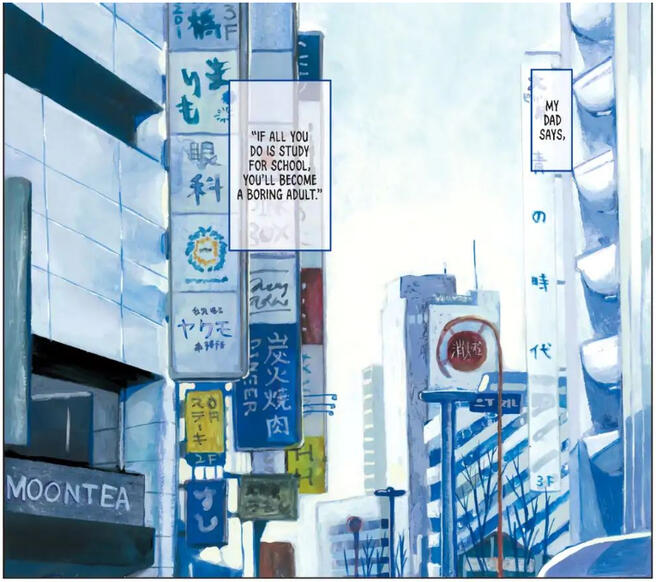
Right when the manga begins, we see Yatora mentioning how his dad said it would be “boring” if he just studied all the time. Yatora, being reminded of these words from his dad, became what people call a “delinquent”. When you think of someone is labeled as a "delinquent", you think of gang activity and violence. But for Yatora, being a "delinquent" means having unkempt hair and piercings, along with staying out late at night, usually until 5 am. Of course, it comes with smoking and underage drinking. In his school, he is labeled as a delinquent, partly because of his appearance that usually intimidates people. and because of the activities he partakes in. For him, the idea of being labeled as “boring” by the people around him if all he did was study, was deemed as a negative label, thus causing him to put on the image of being a delinquent.
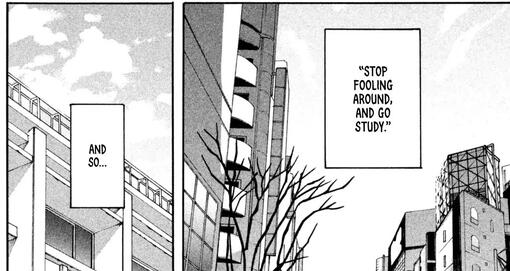
On the other hand, his mother has a more opposing view. “Stop fooling around and go study.” His mother has labeled his delinquent image as something negative, instead saying that studying is much more beneficial to him than anything else. Her words go against what his father thinks; she thinks that being a delinquent is the image that society would frown upon on. This contradicts his delinquent image greatly, because no one expects him to be studious or to try in school. It doesn’t fit the delinquent part of him at all. Even his friends are shocked and surprised by his high rank in class, commenting on how he was supposed to be a “delinquent that plays around all day”.
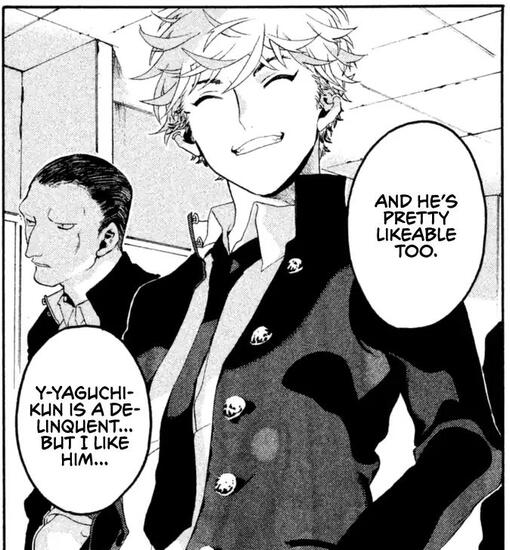
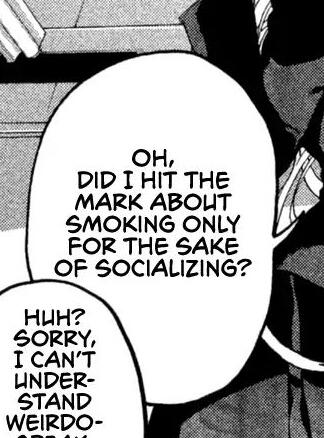
In the panels above, it becomes clear he is merely just living based on how he thinks society would want him to be. When people say he’s a “delinquent” but still “likable”, it is because he actively puts himself out there as so; being liked and approved by the people around you and society in general is what he aims for. He does things to fit in with his “delinquent” friends because of the pressure of an acceptable social standing. When Yuka says “Oh, did I hit the mark about smoking only for the sake of socializing?”, it reveals more about his society-conforming behavior. He wants to fit in somewhere where people will accept him, hence “smoking only for the sake of socializing”. He was only smoking because his friends did, and to keep up his delinquent image.
He feels as if because he is a member of society, he has the need to act in a way that is acceptable to to an extent in order to have a good social standing of any kind. In this way, he has a good social standing keeping up with the “smart delinquent” image, because he is well liked by everyone in school.
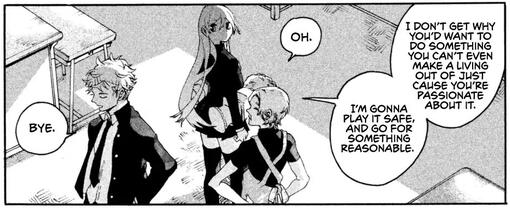
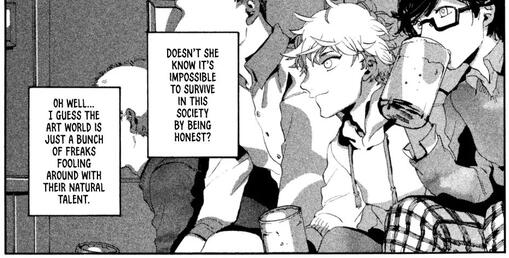
It becomes more and more increasingly obvious that Yatora only cares about the opinion of society. The pressures of people around him and from society has led him to believe that fitting in somewhere in a way he doesn’t seem too different is the ideal. Staying within what society wants and expects from him is what he goes for.In the panel with the teacher and Yuka, he mentions how he will never understand why people will go for something they’re passionate about even though they will never make a good living out of it. This kind of thinking comes from the pressure from society to succeed, and to contribute to society in someway or form. He sees people who pursue their passion as people who are too different. When he mentions how they would “never survive in this society by being honest”, he finds their passion for art to be too different, and thus deems them as failures to society because they would never survive with just their passion and love for art. In his mind, he is thinking not being successful is something to be ashamed of.Iin a way, he could also be projecting his own insecurities that he hasn't acknowledged yet. That despite those who pursue their passion are unknowing of their future, they will pursue it because it's what they want.He talks about natural talent like it is something he has hidden resentment for. Being talented in something gives you approval from society. But when you aren't talented at what you do, then it brings shame and criticism instead.
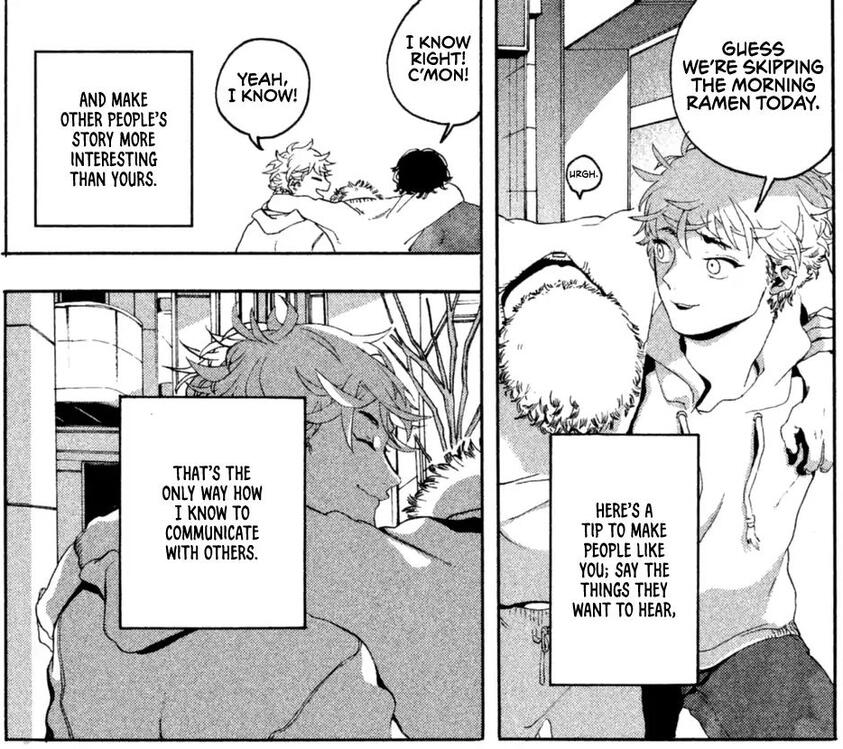
Yatora finds difficulty in communicating with others in a sincere way. Normally, this would make you an outcast of society. Part of being humans means to belong somewhere, to build genuine and long-term relationships with people. Yatora, on his part, finds this difficult; however, he could not bear the possibility of being isolated or "disqualified" from society. He then developed a mindset that revolved around pleasing others and never talking about himself or addressing the problems he kept inside. He kept up a façade in order to fit into somewhere, even if it meant he did not truly feel the same way the people around him felt.Dazai Osamu's book No Longer Human is a story about a man named Oba Yozu who, like Yatora, is unable to communicate with the people of society. He could not properly express himself since a young age because he felt that he couldn’t expose his true self to the world; he found himself much more different than the people around him, and he was afraid that his differences would result in him being shamed out of society. He hides this behind a mask of fake happiness; he tries to make himself popular and accepted by the people around him by turning everything into a joke. This is an interesting part of his character. Many people feel like they do not fit into the “criteria” for the people around them. They feel alienated and insecure, because they are afraid they will be judged for their differences. And many of these people hide their true selves behind a fabricated identity created for themselves.Although a bit more extreme than Yatora's case, both of them being unable to express themselves properly ties to the fear of being shamed for their differences.Ruth Benedict once said Japanese culture consists of "shame culture." But more specifically, what is shame? There are countless definitions and causes for the feeling of shame, but the ones that Yatora fears is the shame that comes from criticism and from acknowledgement. Meanwhile the one that he feels is the shame that comes from praise.
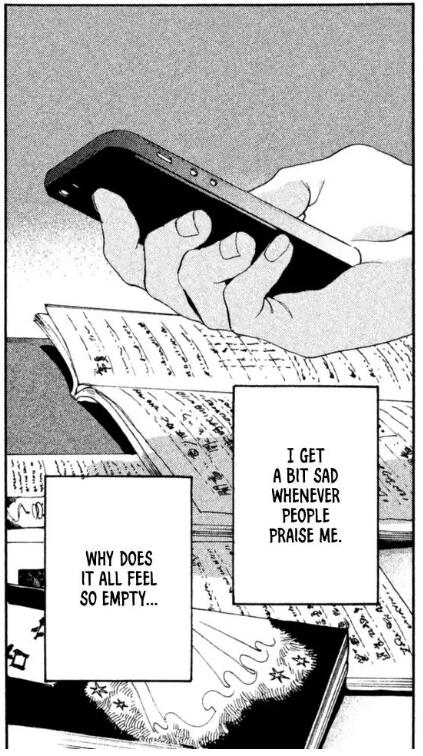
Going back to the topic of him having outstanding grades: it is shown here that despite being top in his class and getting praise from people around him, like his classmates and parents, he feels "sad" and "empty" whenever people praise him. This arises from where he feels as if he should be shameful that people are willing to give him empty praise.But why should he feel ashamed? Isn't being praised for being a genius a good thing? Even if it is empty praise, he should know that him being smart was more of a fact right?Yatora never wanted to be genius. In the scene, he studies right after coming home, and there are countless study books on his desk. He only studied because it was what his mom wished for, and because if he didn't he would be shamed for being unsuccessful. It's all an endless.He feels sad and empty from the praises because this is never what he wanted. Being a genius and growing up to be successful is what his mother wanted, not what he wanted. And being a delinquent, staying out until 5 am, drinking, and smoking isn't necessarily what he wanted either.A "genius" and a "delinquent" are both acceptable social standings in society, and so he chooses to adapt himself into either one so society would deem him as a qualified human.But what does he want then?
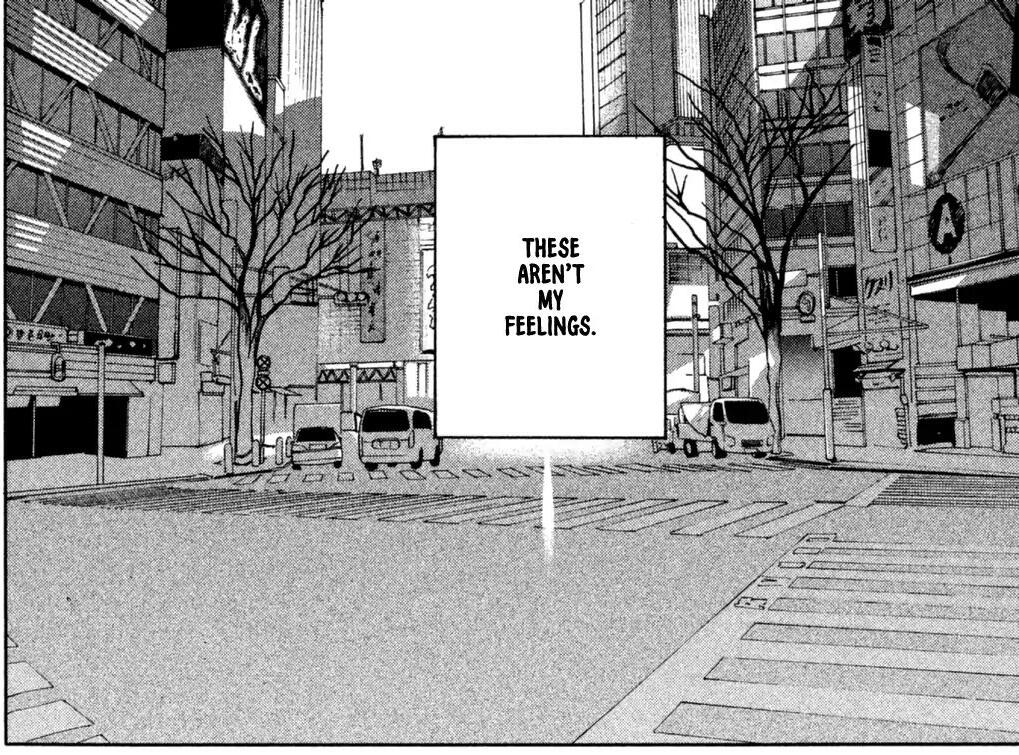
Yatora saw the need to put up an act because in reality, he didn't know who he was at all. In a more simple way, he was alone, with nothing he really wanted to do. He had fun with his friends, but when he's drinking along with them and cheering happily when Japan's football team won, he came to realize that it wasn't his feelings; it wasn't what he wanted. He had went along with his friends because they wanted to and he never spoke his wants or needs in fear of people criticizing him. He has a fear of shame that comes with criticism because he fears the scrutiny that comes from the exposure of something he wishes to keep hidden; and he has a fear of shame that comes from acknowledging that there is something inside him that makes him different from everyone else.
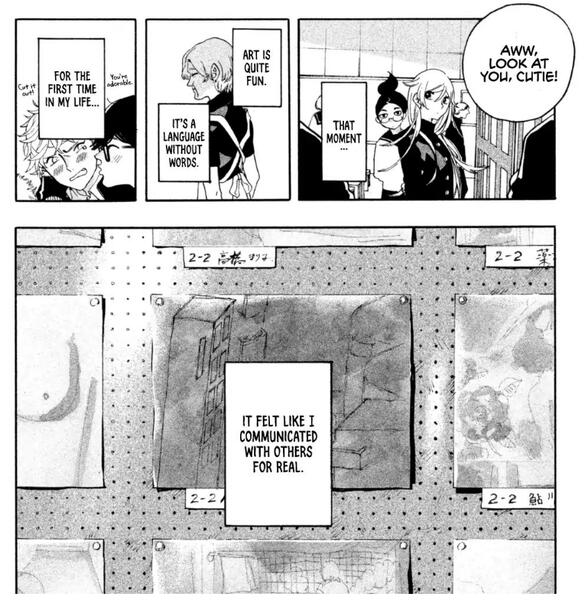
The first painting Yatora ever paints is in his art class; it was a painting of early Shibuya morning, a sight he saw every morning whenever he went home late with his friends. It has splashes of blue, because he has always seen Shibuya in the morning as a "blue world".This connects to Picasso's own work during his "blue period", where all he painted were to show a more somber and depressive era, where his subjects for painting were mainly those who were seen as outcasts of society, like the old, frail, or poor. These people were a common target for scrutiny in society, because they were seen as not fitting in or contributing anywhere. Shame can come from differing race, class, or age. It can come from a difference in anything. That is why shame culture can derive from a difference in orientation.In addition to his subjects, the cool colors that Picasso chooses to use demonstrates a feeling of loneliness and sadness, which were primarily the colors he used throughout his entire blue period era.So Yatora using all blue as a way to show how he sees Shibuya is a way of depicting his loneliness, just like how Picasso uses blue to show loneliness in his paintings. Yatora has come to realize that he is lonely; he is isolated from society even if he keeps up an image because that image isn't who he truly is.When he discovers that him painting has, for once, helped him communicate and connect with others, and that people were praising him for something he composed with meaning and a piece that was filled to the brim of what was his, he finally accepted his differences a bit, and choosing to use art from then on to communicate his deep feelings.
BRUSH TWO.
Yuka and their struggle with people accepting them, and themself.
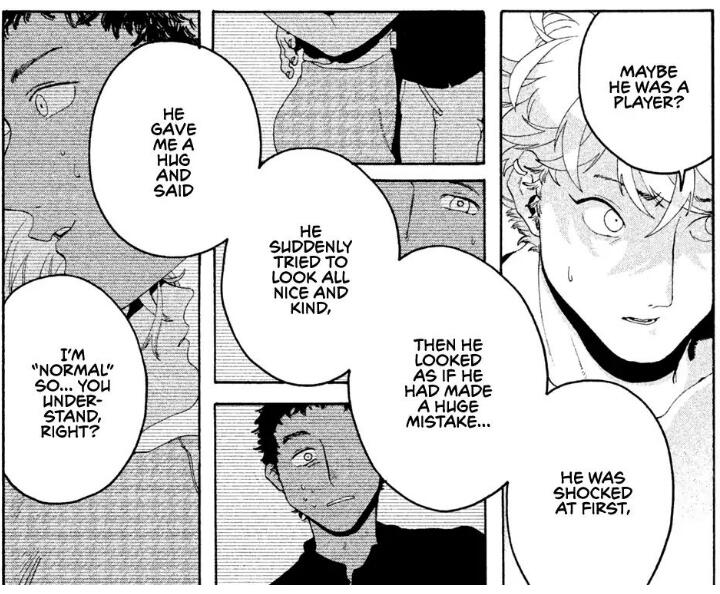
Yuka is labeled as a "cross-dressing" guy by everyone around them, even Yatora. Their real name is Ayukawa Ryuuji, but they go by Yuka instead.No one around them sees them as a girl. Everyone sees the boy underneath the feminine clothes. Even Yatora refuses to see that Yuka is going through a hard time. He calls Yuka by their given name instead of their nickname, which shows how Yatora is struggling with acceptance of differences from other people.Here, Yuka went on a date with a guy they asked out from their art cram school. Yatora happened to be walking through the park where Yuka and the guy met up, and saw the guy hugging them and then leaving. Yuka got dumped because they revealed to them that they were actually a boy. The guy is visibly shocked and then uncomfortable.When he saids “I’m normal”, it adds onto what society deems as normal, and to him, Yuka was not a “normal” person. Society has taught that gender is a two-dimensional concept, and the guy here tries pushing that concept onto Yuka and shaming them because of how they go against such norms. It is also worth adding that there might be the rejection of homosexuality as well; he sees them as a crossdressing boy, thus making the date one that is between a boy and a boy. This might also be one of the reasons why the man looks visibly uncomfortable.
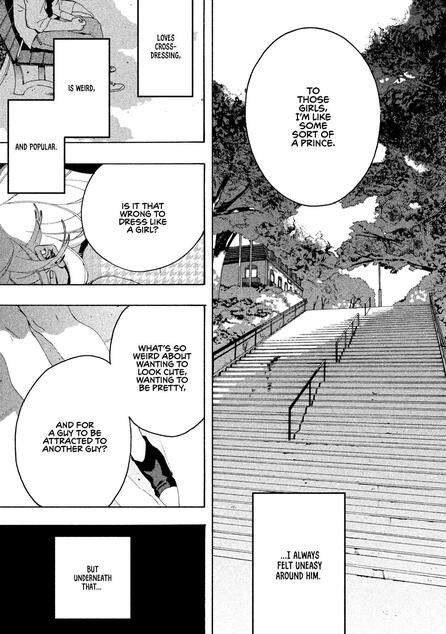
Many more topics are brought in.When other girls see Yuka as a “prince”, they only see a boy who is well versed in “girl talk” of sorts. They can feel comfortable around them because they know Yuka won’t think of them in a way that makes them uncomfortable. Yes, they are accepting of Yuka, but not in a way that makes Yuka happy. They are accepting of them out of convenience.When Yuka talks about whether or not it was wrong to dress like a girl or to act pretty ad cute, they wish for people and society to accept them the for who they want to be. Nothing can be as strightforward as this.Homosexuality is a topic that has been rejected by society for a long time, and even if it is more accepted now, there are people who still widely oppose it. As for transgenders, we don't know if Yuka is truly transgender, as they are okay with calling themselves a boy and they don't get visibly upset when Yatora uses "Ryuuji" instead of Yuka. But even if they do or do not decide to come out as transgender, it is clear this concept is an alien concept to the society in this manga because of how different it is.
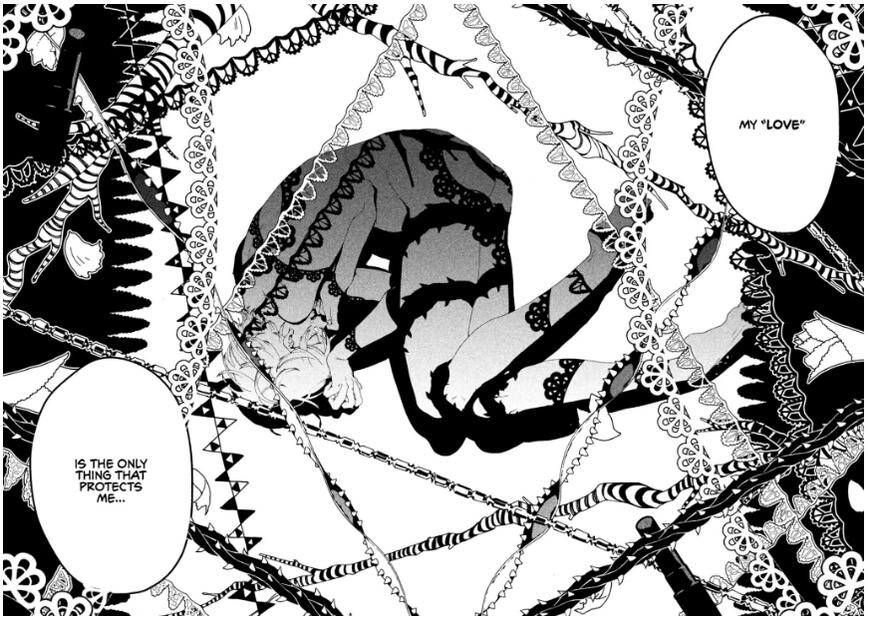
Yuka, despite usually being so aloof to the criticism, like retaliating when Yatora makes fun of them, seems to have a great internal struggle with their self identity. It is at the heart of their problems with fitting in. Cross dressing does not seem like a random behavior or trait then Yuka does for fun. It isn't the same as food or drink preferences. Their problem's can't simply be brushed off as problems with "fitting in" because all these problems stem from a clash of their identity with a world that is very intolerant.Yuka quotes, "My love is the only thing that protects me..." Their "love" could be interpreted as many things, but it is likely their identity. In the image, we see Yuka being surrounded by lace, a more feminine apparel, which could mean that them presenting as feminine is a way of protecting themselves or their identity. However, it could also be seen as a cage or a trap. Society making certain clothes be only for one gender could be a reason why Yuka feels trapped by their skin and clothes. They have no clue of who they are and what they identify as, and wearing essentially "girl's" clothes traps them in one identity. There seems to be an internal struggle of what to present to society.
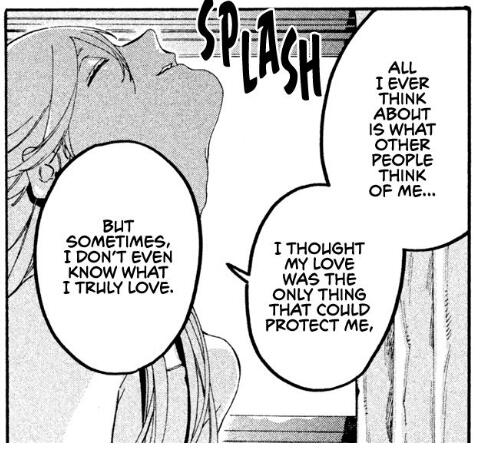
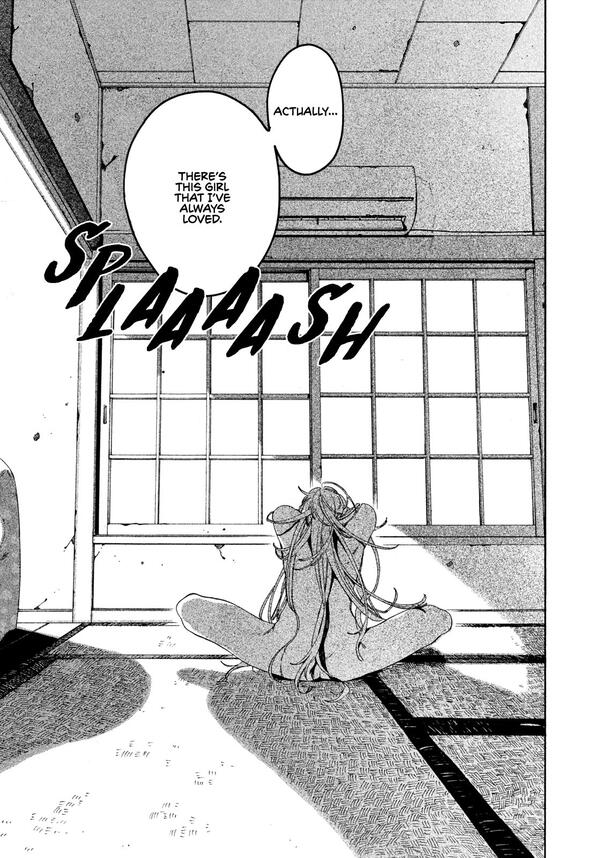
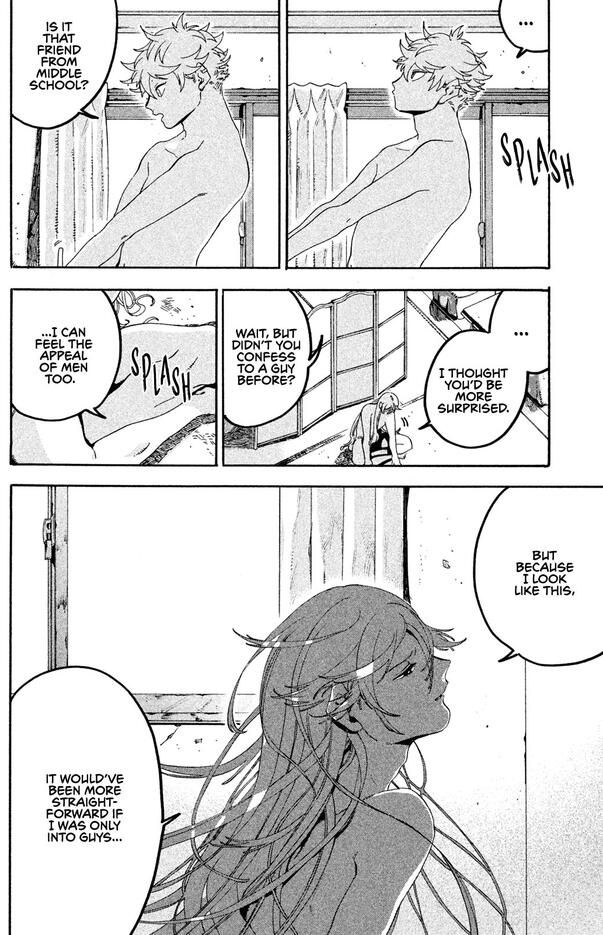
Again, we have the presence of sexuality present here. Because we don't know what Yuka identifies as, we can't assume their sexuality either. But if we look at how there is this girl they have always loved, society would not accept the way Yuka looks right now. Seeing a cross dressing guy love a girl, it would be a target for shame. But when you consider Yuka going for guys, it would be unacceptable both ways. Even if Yuka was presenting in a more masculine form, society would not look upon homosexuality with full acceptance; if Yuka was presenting in the feminine form they are now, they would be scrutinized for being a cross-dressing guy, and the same situation with the guy they went on a date with would happen.Yuka is afraid of the shame that comes with rejection. That if they find their identity one day, what if they are rejected like they were before? When Yuka mentions how if they only liked guys, then it would be a lot more easier because of the way they are presenting. But because Yuka has internal conflict with what they want and who they are, they end up putting themselves in a position that is hard for the world to accept them. Because Yuka is someone who seems strong by putting themselves out there, seemingly laid bare, but in reality, is the same as Yatora: afraid and alone.
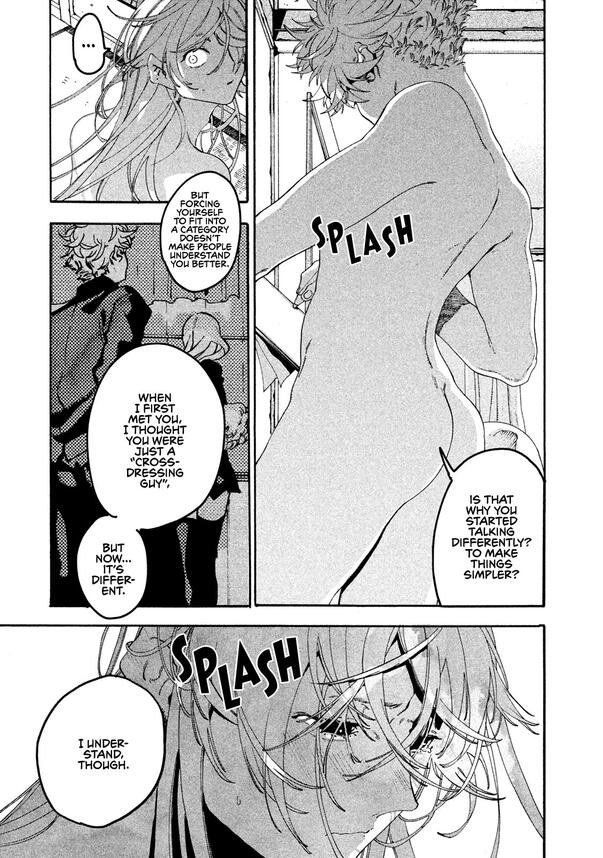
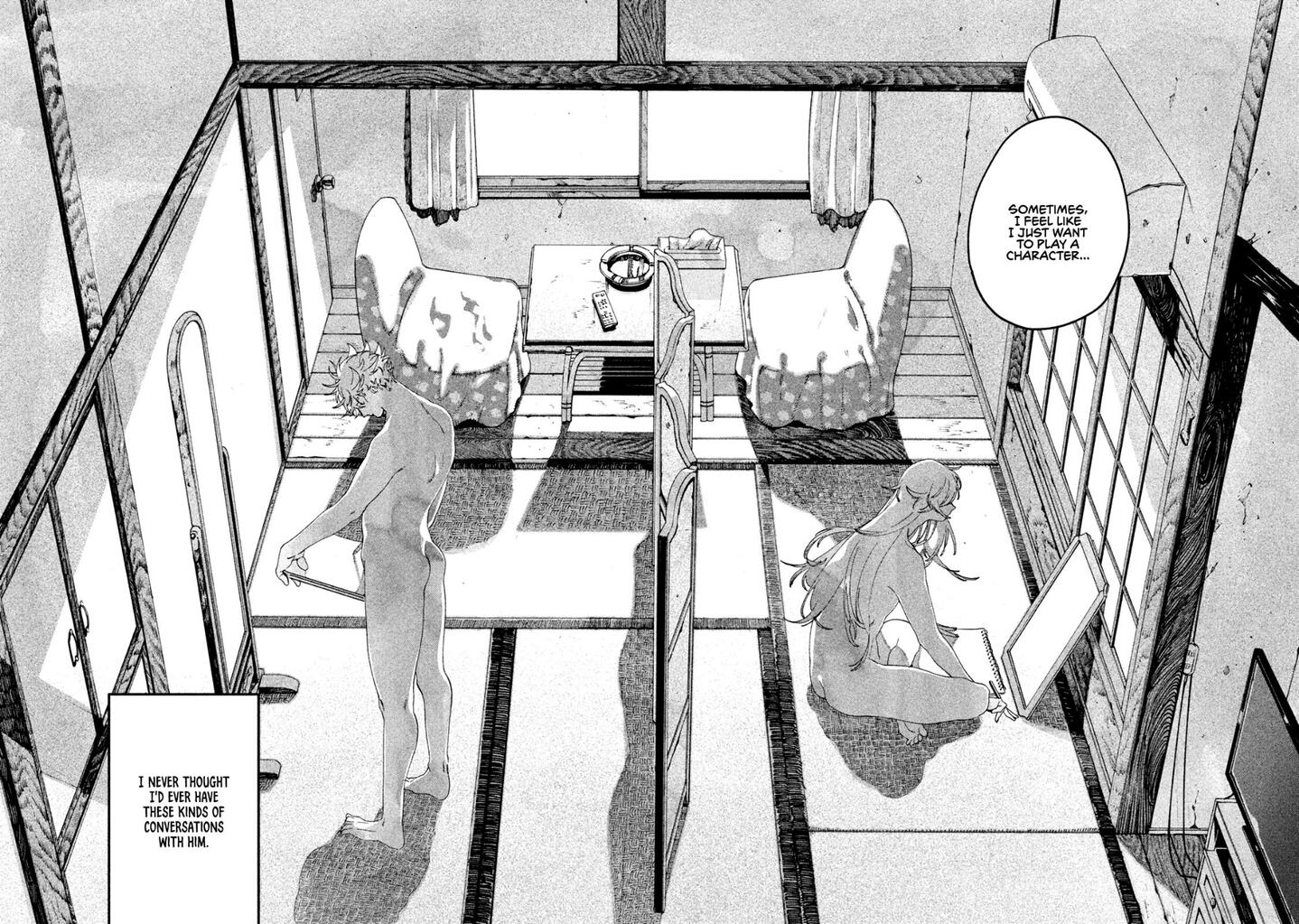
what Yatora means by talking differently is Yatora, in this chapter, started referring to themselves with feminine "I". Before, they had used a masculine "I" (ore) until this chapter. At first, I thought it was because they were starting to come to terms with themselves, but it seems it was because they wanted to make it easier for themselves. Before, when they referred to themselves using the masculine "I", it would cause a clash between appearance and who they struggled with on the inside, making their identity identity even harder to deal with. It especially made it difficult for people to accept them, because of the contrast.
In a way, Yuka was forcing themselves to fit into a category that they knew would be accepted. Feminine presenting but masculine pronouns would be less accepted than feminine presenting and feminine pronouns. It is clear Yuka has a continuous struggle of who they are, but they started using the feminine pronoun in order to conform into society. That is what Yatora meant by "playing character". Yuka was being someone they weren't, essentially playing a character, in order to fit into the "game" which is society.But even if you decide to change yourself to fit into society better, it doesn't mean you'll be understood. If you live in fear of the shame of the exposure of the aspects of yourself you deem as inferior or unacceptable, you will never be understood. I think Yuka knew this, but because they never understood themselves, they had come to terms with other people not understanding as well. No one knew the struggles that Yuka was facing because they never presented it to the world in fear of shame from being vulnerable and different. But Yatora saying that he "understood", it made Yuka feel seen for once.Because they both have felt at some point throughout the series that they could never be understood, they bring out the differences in each other and accept them even if society doesn't. This is a big deal for Yatora especially, because even if Yatora had come to terms with himself, he never was able to take the time to accept Yuka until this chapter. Accepting differences is difficult. Especially with what society pushes onto you.But societal pressures and expectations suffocates you, as we see with Yuka. They are unable to express who they are, their identity - without attracting weird stares from everyone and being treated as an oddity and an outcast from society. They are not even accepted by their own parents for who they are, and are told to "just be normal". But they can't be who they are not.
